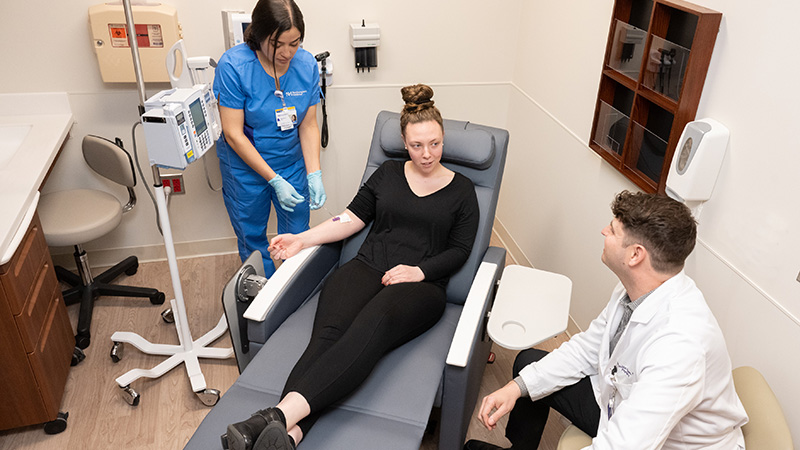Music as Medicine for Alzheimer’s Disease and Dementia
Music Intervention May Increase Communication
Updated July 2022
Think of your favorite song. Where does it take you? What does it stir up? Music evokes emotions and memories, which is why musical intervention has therapeutic benefits for people with dementia or Alzheimer’s disease. Musical interventions have been shown to decrease a patient’s agitation and improve communication and caregiver relationships.
Dementia is an umbrella term used to describe the resulting disorder from brain disease or injury that is marked by loss of memory and cognitive abilities. Alzheimer’s disease is the most common cause of dementia, accounting for 60% to 80% of cases.
Northwestern Medicine Neurologist Borna Bonakdarpour, MD, is a physician musician. He combines his love of music with research on how musical intervention affects the brain of people with dementia.
“When we use musical intervention, we’re looking for areas and networks in the brain that are intact to serve as bridges and help the areas that are not working well,” says Dr. Bonakdarpour. “Singing, for example, can be a bridge to communicating better through language. The rhythmic nature of music can help people walk better.”
Alzheimer’s disease spreads through the brain in a pattern. It typically starts in the areas of the brain responsible for memory and ends in the brainstem, which has a critical role in heart and lung control and swallowing. The long-term memory of music remains intact until the very late stages of disease progression, right before the disease attacks the brainstem. It is currently unknown why Alzheimer’s disease affects this area last. The theory behind musical intervention is that activating this part of the brain can help stimulate other parts of the brain to improve mood and social engagement in people with dementia.
How to Use Music to Help a Loved One With Dementia
1. Work with a trained music therapist.
“Not all memories connected to music are pleasant memories,” says Dr. Bonakdarpour. “A music therapist will work closely with your loved one and family to determine which types of music will elicit the best response.”
A music therapist can help your family determine:
- What type of music to play so your loved one feels safe and not anxious
- Which types of instruments your loved one enjoys hearing
- Where, when and how to play music
- Whether your loved one would benefit from singing or other more interactive musical interventions
2. Do it yourself.
Many people incorporate musical intervention practices on their own. Here are some tips for getting started.
- Play music from your loved one’s teenage years or early 20s. Ask your loved one, or other relatives or friends of similar ages, what music they listened to during this time in their lives. Music from this era helps encourage recall of long-term memory.
- Observe your loved one’s response. If they seem more engaged or content while a certain song is playing, note the music type so you can play more. On the other hand, if they seem anxious, that’s the type of music to avoid.
- Use to soothe. Musical intervention can be a great source of calm for your loved one. Playing music is a way to redirect someone’s attention by giving them another focus when they are agitated or frustrated.
- Use as needed. For many people, music is a part of daily life. If you’re able to play music for your loved one every day and they enjoy it, then adopt the practice on a daily basis. If you can’t be there every day, start by playing music when your loved one seems particularly distant or agitated. If their response is positive, incorporate more of the same kind of music into their routine on a more frequent basis.
How Music Helps Caregivers of Someone With Alzheimer’s Disease
Music benefits not only the person with Alzheimer’s disease, but their caregivers as well.
One of Dr. Bonakdarpour’s studies found that musical intervention improved the agitation and anxiety of both the patient and their caregiver. Social communication between the pairs improved in both verbal and nonverbal ways, like eye contact. For the control group of this study, which did not use musical intervention, communication got worse.
Caregivers find the person lost to them in the context of music.— Borna Bonakdarpour, MD
“People with Alzheimer’s may come alive again when they hear music. Some start dancing alone or with their caregivers, which is a very big deal,” says Dr. Bonakdarpour. “Caregivers find the person lost to them in the context of music.”






